Talking Gods: An interview with writer/director Ross McGregor
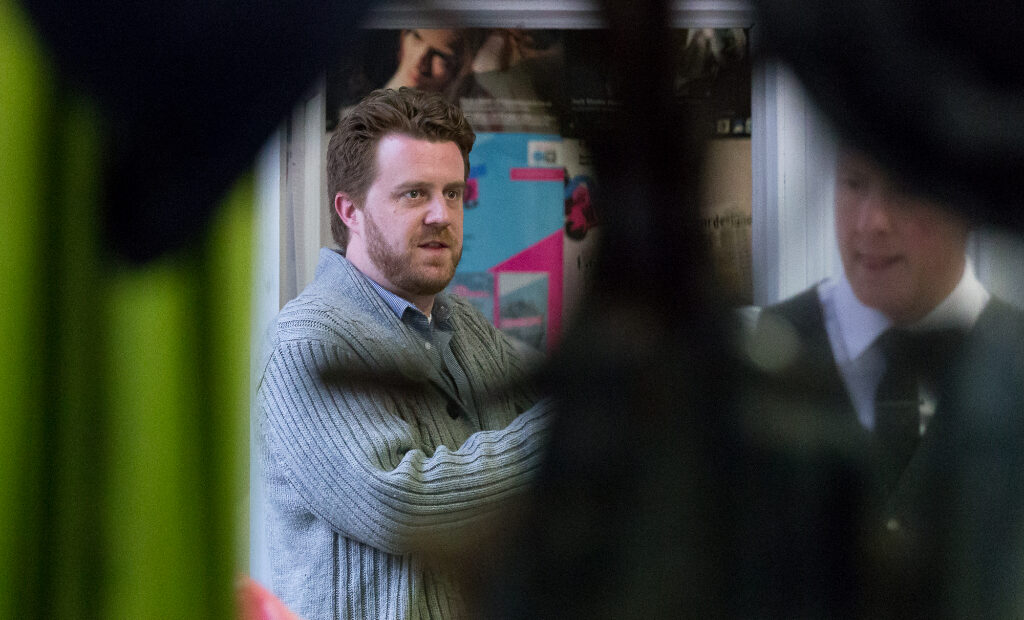
Storytelling is as old as mankind. Without written records it’s difficult to confirm how cavemen related their latest hunting escapades and date nights, but as soon as civilisation was able, authors were recording their tales for posterity. The Ancient Greeks, of course, left a considerable volume of fiction and fable that speaks to the hearts of men and women, even today. It’s from the Greek myths that Arrows and Traps Theatre Company take their inspiration for their return to the (digital) stage with a brand new production. Talking Gods is a series of five plays that reimagine the historic dramas for a contemporary setting. The production has been rehearsed and recorded at Jack Studio Theatre, and during a week-long digital festival in April, the company will premiere one show every night, followed by live Q and A sessions on Zoom.
We caught up with writer and director Ross McGregor and asked him how he approached the project, the state of the theatre industry and more.
Hello, thank you very much for your time. Talking Gods is a digital series of five reimagined Greek myths, spread over a week. What made you go for episodes rather than a larger single work?
A pleasure, thank you for having me. I think if this was 2019, we probably would have had it be one work – with multiple people and characters and plots – but staging/screening it like this is a response mainly to the current situation. Back in March 2020, when we first went into lockdown, I don’t think any of us really knew what to expect
I remember feeling distinctly sure that it would all be over by September 2020. How optimistic I was! I even planned a show for around then, and moved tour dates that had been cancelled that year to Spring 2021.
And then obviously as we moved through 2020, all of that got cancelled or pushed back, or rethought, or scaled down, and then cancelled. Which was hard. And now we’re in a situation where no one can, with any certainty, say when theatre will come back. Not properly. This whole opening for three performances only to have the tier change without warning makes it practically impossible to plan for.
So by the end of last year, I wanted to find a project that could be done regardless of what tier or restriction we were in, which meant one performer at a time, and no live component. Also the myths aren’t really a cohesive story – there are lots of versions, and each one feels slightly independent and sometimes conflicting with the others, so it made sense to focus on them one at a time.
In this unprecedented moment, where everything has gone digital and many have become more tech savvy, you go back to the Ancient Greeks. Tell us some more about the decision.
I do like picking topics or books to adapt that I don’t know much about. I’m a big fan of history, and I like discovering things I didn’t know before. I knew the Greek myths more in terms of the tragedies (which already have quite a few stunning adaptations, so I felt the world didn’t need any more from me), and then just loose notions that I think everyone picks up as they go. For example, I think most people know Medusa has snakes for hair, but maybe not why or how she got them. And I thought it was interesting as a parallel to now, because in terms of theatre, in a way, we’re all beginning again. I don’t think theatre will come back in the same way that it was. It will have to adapt. And largely I don’t think that’s a bad thing.
How did you go about choosing the myths you worked with?
I wish my selection process was more scientific; I wish I was more of a planner. But I’m not – I have an idea, I hear some music, a voice in my head starts talking to me, and I just write down what they say. I wrote each one of these shows in three or four days each, and I didn’t really plan them out. They’re a complete unknown until I start writing.
I read Stephen Fry’s wonderful Mythos, and the sequel Heroes, (I just got Troy for Christmas – happy times!), and chose the ones that I found the most moving or exciting. I knew I wanted a range of subjects – Persephone is quite tragic, but Pygmalion is really fun. I picked the stories that I thought people might have heard of. As much as I love Bellerophon, I’m not sure he’s that mainstream, but certainly a good one for the Disney treatment – flying horse adventures, etc. I also was looking for stories that could be transposed into modern times. It’s hard not to associate Demeter, goddess of the harvest, with the changing of the seasons, therefore the changing of the weather, therefore climate change – you can adapt it like that, quite happily. It’s harder for something like Psyche, which is a lovely story, and probably where we get parts of Cinderella and Beauty and the Beast from, but it’s very much of its time. She’s chained to a rock and sacrificed to a sea monster – I don’t know what the 2021 version of that is. Really high interest rates on a credit card – chained to debt?
How did you approach the storytelling, from ancient through to modern themes?
I tried to stay true to what the original stories were about, but adapt them into our times. It’s not quite reality, but builds a world where the gods have always been there, physically throughout our history – in the open and very much available for interviews and photo opportunities. Basically they’re celebrities I guess, from a famous, much-feared, much-praised family.
The time of the gods is coming to an end, Zeus is on trial for historic sex offences, and Olympus has been raided. The rest of the gods are forced to live amongst us, find jobs, find a purpose, deal with their pasts and look to their futures. Whilst the stories ultimately stand on their own, there is a common through-line across the five, and we move about the world, overlapping the characters and sharing the narrative to an extent. You can see one, and fully get it, but I think there’s something extra to be enjoyed if you see all five, as they all interconnect.
If you had to pick your favourite of the five stories selected, which one would you choose and why?
I never choose between my script-babies. They’re all my favourites. I particularly like the Icarus story just because it deals with some issues that we’ve been facing in the last year, without specifically being about covid, and I have a soft spot for the character of Persephone herself, as she was a lot of fun to write.
What was the process of putting everything together like, with the other members of Arrows and Traps at a distance?
For the most part, it’s been myself writing the scripts, which is quite a solitary task – not really a group activity. But our associate artists have been super helpful. I’ve had two wonderful proofreaders in Cornelia Baumann and Toby Wynn-Davies, as well as Charlie Ryall and Rich Baker always on hand to read things aloud for me to hear it – absolutely vital when you’re writing new things. I have had the invaluable help of associate artist Lucy Ioannou, who has read the scripts, designed the posters, and aided me with the casting – I don’t quite know if any of this would have happened without her. And most of all, I’ve had my producer Chris Tester handling all the practicalities, and of course, raising the funds for the project to happen in the first place. He’s my absolute rock, and cannot be thanked enough. How have we done it? Lots and lots and lots of Zoom and Facebook messenger. It’s weird to not see them but you get used to it.
You are not new to the reimagining of classics – you’ve covered quite a range, from the Shakespeare repertoire to other great literary stories, such as The Strange Case of Jekyll and Hyde and Anna Karenina. Is there one production in particular that you enjoyed the most, or that surprised you while handling the narrative material?
The White Rose, back in 2018, is still my favourite experience in the company so far. It was about the story of Sophie Scholl, who stood up against the Nazis in 1942 using literature and passive protest. She was executed at the age of 21. It was such a powerful story, I didn’t have to invent a word of it – just try and do justice to the historical facts and the real people involved. Everything about that show was just a pleasure and honour to be involved with, and such a great team. But again, I love all my script-babies. Just that one felt like an event at the time, and still does now. I’m really grateful to everyone who was involved in it.
What have you watched or read during these days indoors?
I’ve actually tried to not watch too much television during these lockdowns, because I wanted to stay productive and socialise as much as possible (over Zoom of course). This isn’t me bragging, I was scared that if I sunk into the sofa, I’d feel worse and never get up until Christmas. We need people in our lives. That’s what made this so hard.
So I got really into painting miniatures and playing role-playing games over Zoom (I fully embrace any nerd title you may use for me!). The games were mainly just to have something to talk about other than R rates or who was in a shop with someone not wearing a mask. Instead we were solving mysteries, and escaping monsters, and working out who was the witch – you get the kind of thing I mean. Imaginary goblins made the real ones seem a little easier to live under. But of the things I did see, I would heartily recommend I May Destroy You, the most recent David Copperfield film, anything at all by Neil Gaiman, the Disney+ recording of Hamilton, the National Theatre’s recording of Small Island – what a show that was! I’d watch it every day if I could. I also worked my way through a massive biography about Ernest Shackleton, which was great for the imagination but tough on the wrists. It was so heavy: 1200 pages!
If you could choose an era to escape to, where would you go and why? Who would you like to meet?
Nice question. The trouble with time travel is that you can’t go too far back without losing access to the NHS, antiseptic and anaesthetic. And I’m a complete wuss about injuries and illnesses. What if we’re in 1200 AD and I need a dentist? Are there showers? Are there bathrooms? But if we’re thinking theoretically, I’m going to have to 1920’s Paris, because that’s every writer’s dream I think, or Elizabethan London, because I really am curious if audiences laughed at some of the jokes. People tell me Mercutio is hilarious… I’m yet to find proof of this. And I’m an English teacher, so very familiar with the text. I guess the problem with Shakespeare’s London is that there was a plague there too, and 1920 you had the Spanish Flu – so maybe I should just stay home for now.
Technology has drastically changed the way the world enjoys entertainment. Do you think digital and streaming will continue to play a big role in the theatre industry?
I think two things will change for theatre post COVID: I think its relationship with freelancers will have to be looked at. I think last year everyone was particularly shocked by how bad it all got, and how quickly it got there. The nature of the business is that we’re constantly job to job, always busy, always working, if you don’t have a project on the go, you’re working on the next one. And when the theatres shut, a lot of people, myself included, got into difficulty within a month or two. I suppose it doesn’t help that a lot of us have second jobs in hospitality, events and education – three other hard-hit areas. So I really think that this is something that is going to have to be addressed soon so that the industry generally feels safer and more stable for everyone that works in it. Because it’s not just actors that live perilously. We all do.
The second big change I think will be that streaming and recorded performances will be here to stay. I think that’s a wonderful thing because it allows your work to reach people that wouldn’t normally get to see it. It’s not going to replace live theatre – it can’t – but I don’t think it’s trying to. I love some of the ingenious ways that people have dealt with the last year. Bird Song over Zoom? Why not. Virtual reality Sherlock Holmes? Go for it. Hamilton and Disney – take my money. It’s not live theatre, it’s not YouTube content creation, it’s not film or cinema, it’s something else – something theatrical made for screen. I don’t know – I just think that what happened to the theatre industry can’t happen to us again, and having projects online and digital is a way to stabilise and regulate income for companies and creatives so that they’re not left without hope and support as they were last year. Yes, the government provided £1.5 billion – but it went to buildings. Not people. And the very fact that everybody suddenly needed saving suggests that something was rotten in the state of Denmark to begin with.
I think it’s exciting and just shows you what imagination can do. Not everyone can get to London. Not everyone can afford the front row. I think it’s great for someone, I don’t know, let’s say in Newcastle, to turn on their computer or phone and there it is: Hamlet or Fleabag or Follies – there you are, enjoy, £5.99 a month please. I think what the National are doing with their At Home subscription is perfect – should have happened years ago – necessity being the mother of invention and all that. We are waking up to how things need to be.
For the young talent who are feeling discouraged and lonely, what advice would you give?
Goodness. What a big question. Most of all my advice is to hang in there. Things, opportunities, jobs, castings, gigs – they will all come back eventually. There may be a gap now, and then a heavily over-subscribed application process as it does start to trickle back, but things will get better. What maybe some people don’t realise that the break-even point on theatre is high. Really high. So whilst social distancing is in place, there won’t be much live stage work going on that isn’t subsidised. It’s going to take time to detach ourselves safely from the safety measures like social distancing, it’s going to take time until theatres can be at 90-95% attendance. And it cannot be rushed. At all. So until that point, many producers and the “people that make shows” won’t feel confident taking a risk. Because a show that has to cancel could kill a company.
But please know that we want to come back as soon as you do. We feel exactly the way you do, and are as sad/quiet/angry/lost as you are, at points. Definitely. My advice would be “don’t be too hard on yourself”, if you possibly can.
We are so busy usually, and so driven and passionate – it’s really hard to be told to shush and get off the stage. But we must, for the moment. Write your play that you’ve been putting off, get in touch with some exciting people on Twitter who make work that makes you feel something, or just be kind to yourself, and work on having some down time and rest. Focus on what’s in front of you. Don’t shut down or give up. Because you will come back. Maybe not tomorrow, but you will come back. And we’ll all going to need you when you do.
Can you share any hints about what’s coming up next for you and Arrows and Traps?
I refer you to my previous comment about reading a biography on Ernest Shackleton. There’s definitely a story there for me, beckoning. But who knows? Perhaps Talking Gods: Season Two? Who knows – it’s in the hands of the gods and fates. We wait to see. It’s certainly not the end of Arrows and Traps – we have too many stories to tell you. And the muses aren’t done with me yet.
Cristiana Ferrauti
For further information about Talking Gods or to book tickets visit the Arrows and Traps website here.

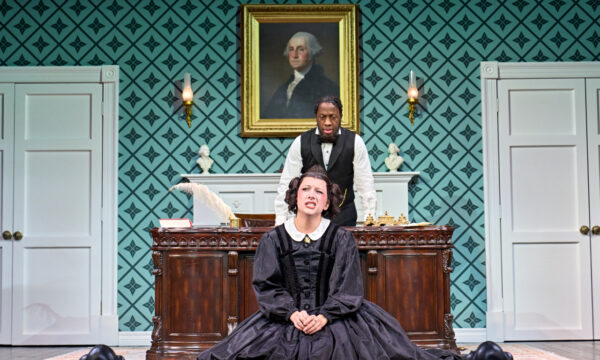
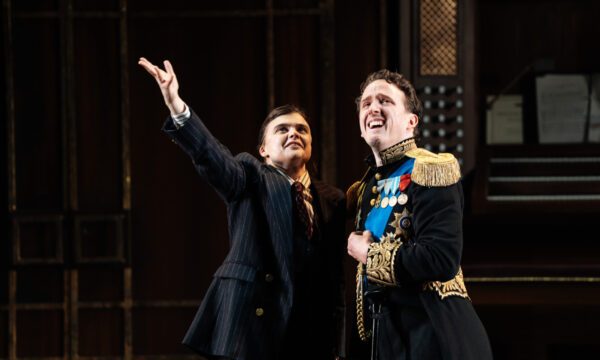

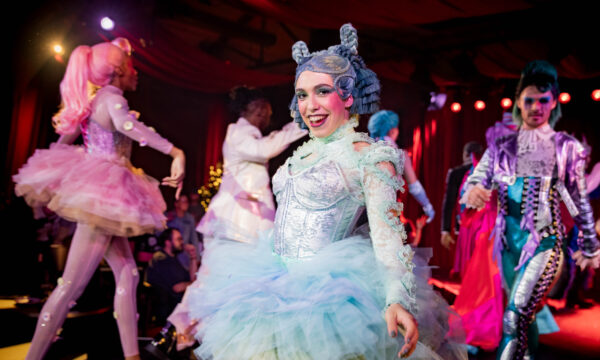
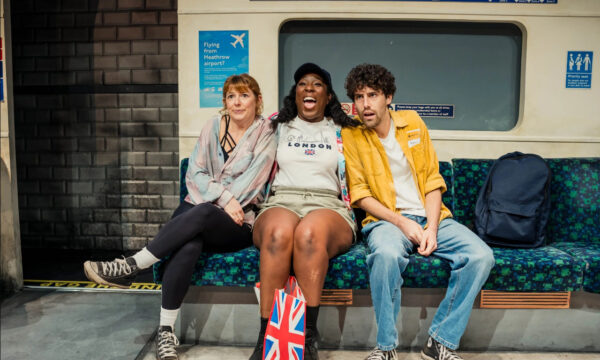
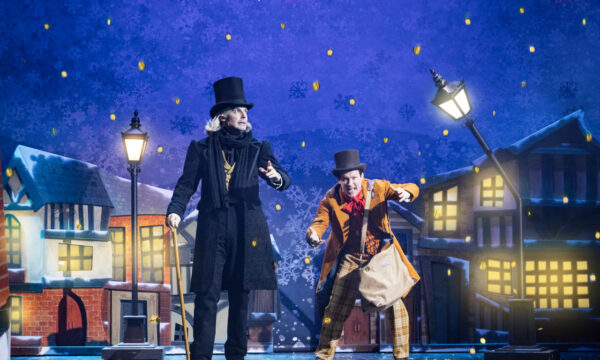
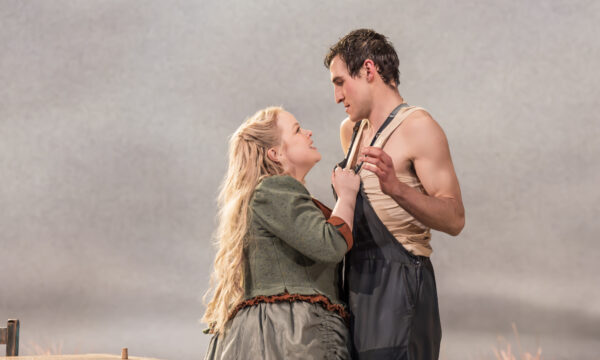

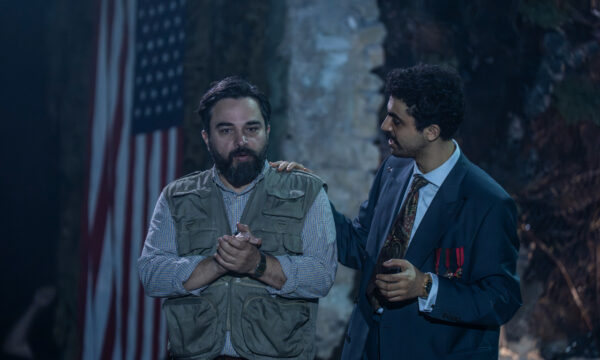


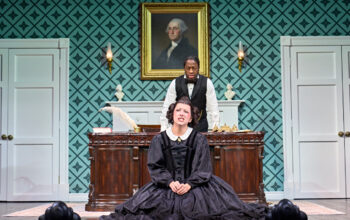
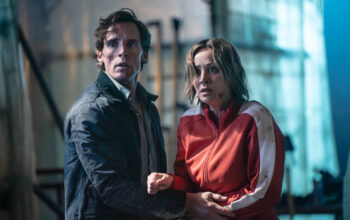
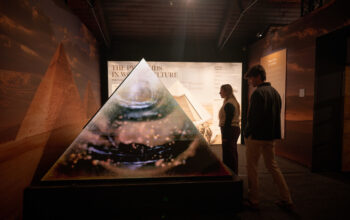


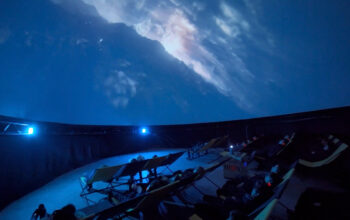



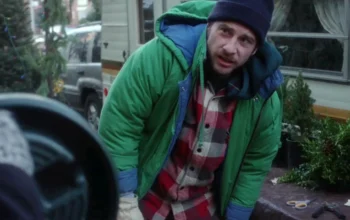
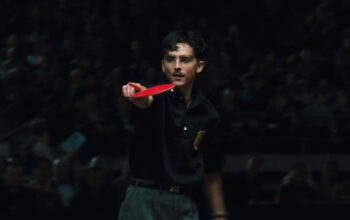


Facebook
Twitter
Instagram
YouTube
RSS